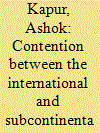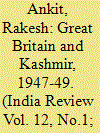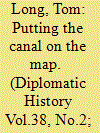| Srl | Item |
| 1 |
ID:
084852


|
|
|
| 2 |
ID:
100912


|
|
|
| 3 |
ID:
119382


|
|
|
|
|
| Publication |
2013.
|
| Summary/Abstract |
In 1953, a book on Jammu and Kashmir titled The Grim Saga (Dasgupta & Co. Ltd.) came out in Calcutta, India. Its author, S. N. Shivpuri, lamented "the triple tragedy of Kashmir-local, subcontinental and international." Almost five decades since then, a great deal has been written about the local and subcontinental tragedy(s) in Kashmir. This article instead turns its gaze towards the international aspects that accompanied the evolution of the first India-Pakistan conflict over Kashmir from 1947-49, which sowed the seeds of the enduring dispute between the two countries. Focusing on the British policy towards Kashmir during this period, it contends that the impact of three wider, over-lapping contexts of international geopolitics, namely, British fears about unrest in the north-west of Indian subcontinent along the border with Afghanistan, British involvement in the Middle East, and British plans against the former Soviet Union, affected the official interpretation of British interest in Kashmir. These contexts, in turn, were created by the two themes of decolonization in South Asia and the Cold War in that pivotal year of 1947.
|
|
|
|
|
|
|
|
|
|
|
|
|
|
|
|
| 4 |
ID:
173569


|
|
|
|
|
| Summary/Abstract |
Covid-19 is the cusp of change. The global pandemic will alter the course of history and rattle the corridors of the global power politics in the years to come. The world has a new enemy- the novel coronavirus or Coivd-19 as declared by the World Health Organization (WHO). The post Covid-19 world will be completely different and like the Arab historian Ibn Khaldun said that random pathogens can cause the rise and fall of empires and civilizations, so will Covid-19.
|
|
|
|
|
|
|
|
|
|
|
|
|
|
|
|
| 5 |
ID:
132024


|
|
|
|
|
| Publication |
2014.
|
| Summary/Abstract |
In the early 1970s, Panama's negotiations with the United States over the status of the Panama Canal ground to a standstill. General Omar Torrijos had rejected treaties left unratified by previous governments only to receive a less generous offer from the Nixon administration. Realizing that the talks were being ignored in Washington, the Panamanian government worked to internationalize the previously bilateral issue, creating and exploiting a high-profile forum: Extraordinary meetings of the UN Security Council in March 1973 held in Panama City. In those meetings, Panama isolated the United States in order to raise the issue's profile and amplify the costs of leaving the matter unsettled. Using underutilized Panamanian sources, this article examines that meeting, the succeeding progress, and the effect of this early stage on the final negotiations several years later. The case also illustrates how, during the unsettled international environment of the 1970s, a small state utilized international organizations to obtain attention and support for its most important cause.
|
|
|
|
|
|
|
|
|
|
|
|
|
|
|
|